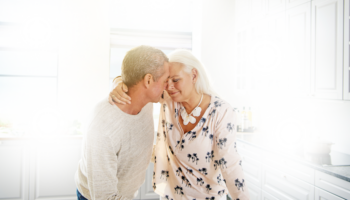Health conditions and sex
Sex and Sadness: How to Cope With Depression In Your Love Life
While often debilitating emotionally as well as physically, here are techniques that might help
If you know someone who’s depressed, please resolve never to ask them why. Depression isn’t a straightforward response to a bad situation; sometimes depression just is, like the weather.
Try to understand the blackness, lethargy, hopelessness and loneliness they’re going through. Be there for them when they come through the other side. It’s hard to be a friend to someone who’s depressed, but it is one of the kindest, noblest and best things you will ever do. - Stephen Fry
While I’ve written quite a few articles over the years, on a wide variety of topics, I’ve rarely spoken about myself - especially around sex.
Yes, I recently wrote of being in a full-time BDSM relationship but while that was important at the time, the subject of this article is more personal, even more critical to openly discuss.
While the exact number is hard to pin down, the World Health Organization estimates that more than 300 million people worldwide suffer from depression, with 40 million of them being here in the United States.
I am chronically depressive. In fact, I often think that I have always been depressed in some way or another, that there have only been bad days and worse days - and nothing else.
Ironically, this is the depression saying this. But while I know, logically, that my perspective is skewed, it doesn’t alleviate the deep sorrow I so often suffer.
I’m telling you this to elicit sympathy but to publicly acknowledge what so many suffer in silence. Depression is nothing to be ashamed about, it doesn’t make you less of a person, and - even when the bad days get so very, very bad - there should always be optimism that you, and the people you care about who also have or are experiencing depression, can find help or even heal from its horrible effects.
This is particularly true in regards to sex. Already far too much of an emotional minefield full of performance anxiety, fears of disappointment, feeling inadequate, being haunted by guilt and suffering from shame, sex can be even more traumatic for those dealing with depression.
Already far too much of an emotional minefield full of performance anxiety, fears of disappointment, feeling inadequate, being haunted by guilt and suffering from shame, sex can be even more traumatic for those dealing with depression.
Before I go any further, though, I want to take a big step back. And before getting into what I hope will be helpful suggestions, I want to talk a little bit about the realities of depression.
First of all, no one (so far, that is) currently understands the origins of depression, although it is becoming evident that many of its roots lie in emotional trauma and/or biochemistry. I myself have felt both, having had severe depressive episodes that were triggered by memories of childhood abuse and neglect as well depressive episodes that seemed to come out of nowhere, where I felt like it was my brain and not my mind that was the cause.
Similarly, depression can manifest in hundreds, or even thousands, of unique ways including irritability and frustration, profound loneliness and isolation, lack of interest in anything (including sex), negative thought loops, exhaustion (no matter the amount of sleep), and even, at the absolute end, self harm or even suicide.
Because of this it’s important for those with depression, as well as those in a relationship with someone experiencing depression, to seek out professional assistance and not try to self-diagnose- or dismiss what you are experiencing as not “true” depression.
You can find an excellent pair of resources at Mentalhealth.gov and the Crisis Call Center‘s hotline at (800) 273-8255. Both come courtesy of the amazing JoEllen Notte, a writer, speaker and mental health advocate who is much more an expert than I ever will be and whose work I will be referencing many times in this article.
The Experience of Depression Is Unique for Everyone
Depression is a personal thing and because your experiences are unlike anyone else's, try to approach the advice in this article with less of an eye toward finding a “cure” and more as a way of finding a tool that might help you.
If none of these ideas does the trick then please never stop trying. Maybe the next article or therapist or medication will be the one that turns the corner. Even though the darkness can seem so impenetrable and absolute there really are beautiful things waiting for you in the future.
Love and Respect Yourself
Personally, one of the most important tools I’ve discovered in regards to depression and sex is respecting self-care by loving and respecting myself for decisions I’ve made to protect myself and seek out pleasure.
Don’t get me wrong, while this is way too often easier said than done it’s always worth working on. Part of this love and self respect is resisting the tugs of “should” and “must” around sex. There is nothing wrong with taking time to emotionally heal, and to allow things to move at their own pace.
And, when you feel it’s time for sex, try to look forward to lovely little pleasures. In other words, look at sex as another form of self-care, where making out is like having a big piece of chocolate cake and oral sex is like a warm and welcoming bed. Self care means taking things as you need and like and not forcing yourself to live up to imaginary expectations.
Just Do It - or Don't
Notte has excellent thoughts on this as well, encouraging people with depression to develop a personalized, self-aware approach to sex as a way to rise out of a lethargic, numb state and take control back from depression. In this way, you can merge the idea of “just do it” (pushing yourself to restart your sensual motors) with “don’t just do it” (taking things slowly and cautiously) by making it a conscious decision.
As she writes in her article “Sex When You’re Depressed - Don’t “Just Do It”
“By making conscious choices you become better at recognizing when your desire is being affected by the illness (or meds). You become tuned into yourself. I’ll give you an example: You can be with a partner who you love and are comfortable with and when the sex wanes you blame it on depression and keep on going the way you were. Suddenly one day you feel desire, but not for your partner and realize that what happened there was that you had just assumed everything was about the depression so when you stopped being sexually into your partner, you missed it. Bad scene.”
Read: It's Not You: 4 Signs Your Partner's Too Depressed to Have Sex
The Importance of Trust
This leads into another key factor when talking about depression: trust.
While depression can be in the brain and not always the mind that doesn’t mean that an episode can’t be triggered by outside forces.
For many, depression can take the form of deep disappointment, shame, or guilt in things that have been said or done (or not done). There is the feeling of inescapable worthlessness made all the worse when life reinforces this belief as well as when good times don’t seem to “stick” in the mind.
What’s worse, these negative feelings can be given a devastating boost when they are “proved” by humiliation, criticism, or even a careless offhand comment thrown at a depressive, especially by a person they care about.
The thing about this, though, is that it is unfair for those in a relationship with a depressive to hold them to violating that trust if they don’t know anything about these triggers.
Which leads us back to trust. While it can may times be a huge hurdle to overcome, if you are depressive you should try to share your feelings, emotional history, triggers, and most of all your needs with your partner. Tell them what helps, what doesn’t, and what makes you feel loved, wanted, and desired.
And for those who are partners with depressives listen and respect that they are saying. You have been blessed by being given the keys to their emotional safety and happiness - this trust is never to be taken lightly.
If you break it and inflict emotional harm - for any reason - you are guilty of abuse. The same goes for those with depression: if your partner ever uses your trust in any way that is not positive and respectful then get out of that relationship.
Help - but Don't Try to Fix
One key factor that is important to address in regards to depression in sex is the far-too-common misconception that it can be fixed. While there are great medications (although some do come with some frustrating sexual side effects) and promising therapies, hearing from your partner that you are somehow sick and, oh, by the way, they just heard about this miracle supplement on Oprah that has … well, you get the gist.
JoEllen Notte puts this perfectly in her article “5 Steps To Take When Your Partner Is Dealing With Depression.”
“Remember your partner doesn’t want the depression to be there any more than you do (in fact they probably want it there even less than you) so get on their team. What does that mean? It means following their lead. It means listening more than you talk. It means trusting your partner. It means believing them when they describe their symptoms. It means learning what depression is. It means not trying to fix them. It means meeting them where they are. It means recognizing that they aren’t their diagnosis. It means being willing to communicate differently.”
This also means understanding that what your partner needs may not be what you think would be good for them. Getting frustrated that they are still depressed after all the special things you did for them (but more for yourself) will absolutely do more harm than good.
Instead, ask for what they want or, even better, remember what they said they needed. Maybe it's spending time curled up in bed with a favorite sex toy, maybe it’s a hug, a sweet kiss, the words “it’s all going to be alright,” an hour of oral sex, or kind words about how wonderful and brave you think they are. Respect again, trust again - always!
Kink and Depression
For some, BDSM can be an effective means of processing and even helping overcome depression. The physical side of things helps those with depression push through their negative spaces or even achieving moments of emotional understanding and clarity. Bondage, for example, has been used as a meditative tool as well as a way to feel safe and protected.
Read: BDSM and Mental Health: When Kink Clears Your Head
On the emotional end, a dominant and submissive relationship can be created that directly addresses depression, with the dom being a positive influence in the sub's life by caring and nurturing their physical health and emotional well-being.
With both of these, careful and respectful negotiation is a must. I would personally go so far as to say that depression should be brought up as one of the first things when two kinksters set out to play. It is a lesson that I learned slowly over the years but have come to realize is a necessity. I need to be upfront with my physical needs, emotional security, triggers and, most of all, the importance of trust that anyone I play with has my safety in mind.
Take It One Day at a Time
Depression is a huge subject and, sadly, our space here is limited. Meanwhile, I heartily think you should check out JoEllen Notte’s excellent articles and resources on the subject here on her site and be sure and keep tabs on the release of her upcoming book, "The Monster Under The Bed," which is all about sex and depression.
But before I go I want to give you a hug, a kiss on the cheek, or just a sweet and heartfelt smile - and hope.
Depression is real; it can be extraordinarily painful; it can make it seem like it will never end but please take it from me: this is a dark illusion. If you cherish and respect your needs and your desires, work to love who you are - even with your depression - and find good friends and partners who accept all of who you are, there will come a time when the sun will come out … or the clouds, at least, will seem so much less dark and stormy.




